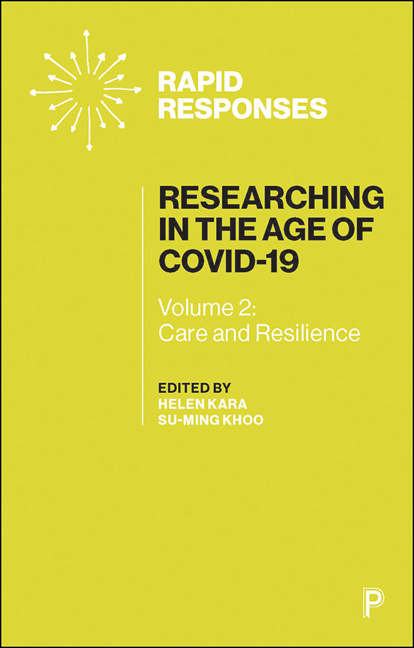11 - Prioritizing Inclusion, Ethical Practice and Accessibility During a Global Pandemic: the Role of the Researcher in Mindful Decision Making
Published online by Cambridge University Press: 23 March 2021
Summary
Introduction
Within the context of COVID-19, the potential for a reimagining of how we carry out ethical and inclusive research has come to the fore. There is the possibility for widespread use of digital methods of conducting research, however, there are access, inclusivity and ethical issues to be closely considered. This chapter will specifically focus upon how digital methods influence both disabled participant and researcher experiences. Disability will be a key focus throughout; however, the key points could be applied to a variety of projects.
Following a nationwide lockdown in March 2020 as a result of the global pandemic COVID-19, there has been a rise in the use of online spaces and technologies. This time has enabled and, in many cases, enforced innovation as researchers have had to create new ways of engaging with participants. Digital technologies are often assumed to be open and accessible to ‘all’, however, digital inequalities continue to exist and shape people's lives (Robinson et al., 2015). As researchers, we must avoid falling into the trap of describing online research as solely opportunistic and without potential risk. With the rise in digital methods of data collection, the need to avoid exacerbating inequalities and power imbalances is increasingly salient.
With the use of digital methods, it is essential that participants have a full understanding of who the researcher is and why research is being carried out. As a result of fewer visual and communicative cues being present with digital methods than with in-person research, participants may disclose information that they would perhaps not share in a face-to-face situation. Furthermore, there is a risk of overidentification, that might be regretted at a later date (Finch, 1993; Tregaskis, 2004). For example, both researcher and participant(s) having a disability does not erase the possibility of stark differences (of socio-economic or political status, ethnicity, sexuality, race or religion, for example). The need to manage identities translates into the need for transparency whereby the researcher is honest and clear about the research aims.
Participants are often encouraged to bring their whole selves to research projects, making it essential that researcher identity is also shared as, often, very little is known about researchers. Making researcher biographies available and accessible enables identities to be known which may serve to make the research process more transparent.
- Type
- Chapter
- Information
- Researching in the Age of COVID-19Volume II: Care and Resilience, pp. 121 - 130Publisher: Bristol University PressPrint publication year: 2020



